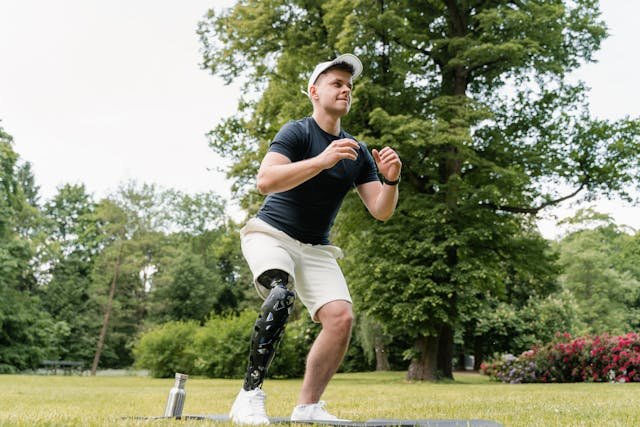For a child, growing up with a prosthetic limb is more than just learning how to walk, grasp objects, or play—it’s also about building confidence, self-acceptance, and emotional resilience. While prosthetics help children regain mobility and independence, they also come with unique psychological challenges and emotional adjustments.
At Robobionics, we believe that a prosthetic is not just a medical device—it’s a tool that empowers children to live freely, embrace their identity, and achieve their dreams. In this article, we will explore the psychological impact of wearing a prosthetic as a child, how it affects self-esteem, relationships, and emotional well-being, and what parents can do to help their child thrive.
1. Understanding a Child’s Emotional Journey with a Prosthetic
Adjusting to a prosthetic limb is a deeply personal and emotional experience for a child. It involves learning, acceptance, and sometimes, frustration or fear.
The Initial Adjustment Phase
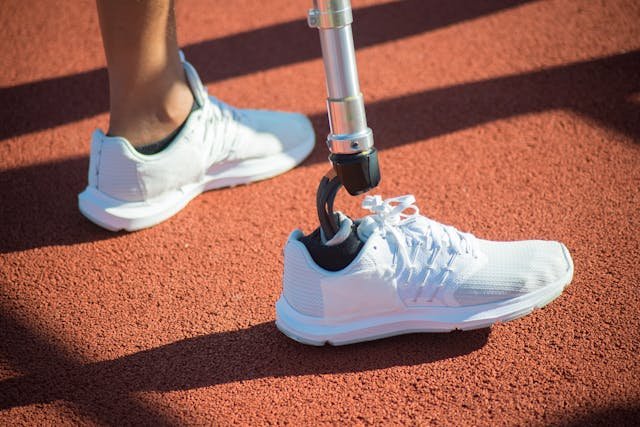
When a child first receives a prosthetic, they may feel excited, nervous, or even hesitant. Young children often adapt quickly because they see the prosthetic as part of their body, but older children may be more aware of their differences and feel self-conscious about wearing a prosthetic in public.
This phase requires support, reassurance, and patience from parents, caregivers, and therapists. Encouraging a positive attitude toward the prosthetic helps a child embrace it as a tool rather than a limitation.
Frustration and Emotional Ups and Downs
Like learning any new skill, using a prosthetic takes time and practice. Children may feel frustrated if they struggle with gripping objects, balancing, or keeping up with their peers in physical activities. These moments can lead to self-doubt or feelings of discouragement.
Encouraging small milestones—such as successfully tying a shoelace, holding a spoon, or walking independently—helps children see progress and build confidence in their abilities.
The Journey to Self-Acceptance
For many children, the emotional journey with a prosthetic is about learning to accept themselves as they are. As they grow, they may compare themselves to their peers and wonder why they are different. Parents play a crucial role in helping their child see their prosthetic as a strength rather than a limitation.
At Robobionics, we design customized prosthetic limbs that allow children to express their personality and feel proud of their uniqueness.
2. How Wearing a Prosthetic Affects Self-Esteem and Confidence
A child’s self-esteem is shaped by how they see themselves and how others treat them. A prosthetic can impact their confidence, interactions with peers, and overall self-image.
The Influence of Social Perception
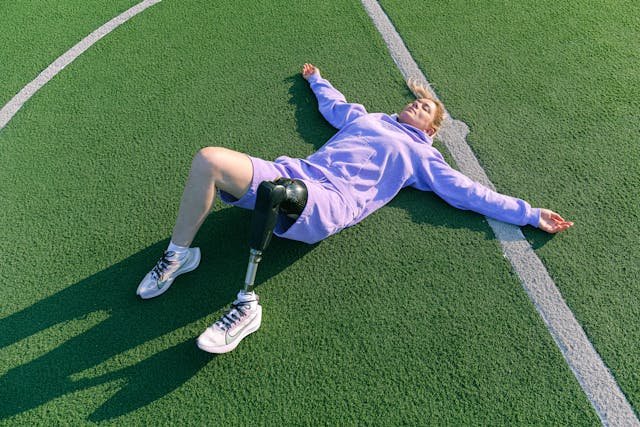
Children are naturally curious. When they see a friend with a prosthetic, they may ask questions, stare, or react in unexpected ways. This can make a child wearing a prosthetic feel singled out or different, especially if they sense pity or discomfort from others.
Parents can help by teaching their child how to talk about their prosthetic with confidence. Simple, positive responses like “This is my special hand—it helps me do everything I love!” can make social interactions less stressful and more empowering.
Overcoming Self-Consciousness in Public
Children with prosthetics may hesitate to participate in group activities because they feel self-conscious or afraid of being judged. Whether it’s playing sports, swimming, or dancing, they might hold back because they worry about how others will react.
One way to boost confidence is by finding supportive environments—such as inclusive sports teams, peer support groups, or activities designed for children with limb differences. Surrounding a child with accepting and understanding friends can make a huge difference in how they see themselves.
Encouraging a Positive Self-Image
A prosthetic should feel like an extension of a child’s body and personality, not just a medical device. Choosing colorful, stylish, or personalized designs can make a child feel excited and proud of their prosthetic.
At Robobionics, we offer customized prosthetic designs that allow children to express themselves—whether they love superheroes, bright colors, or creative patterns. Feeling good about how their prosthetic looks can boost their confidence and self-esteem.
3. Navigating Friendships and Social Interactions
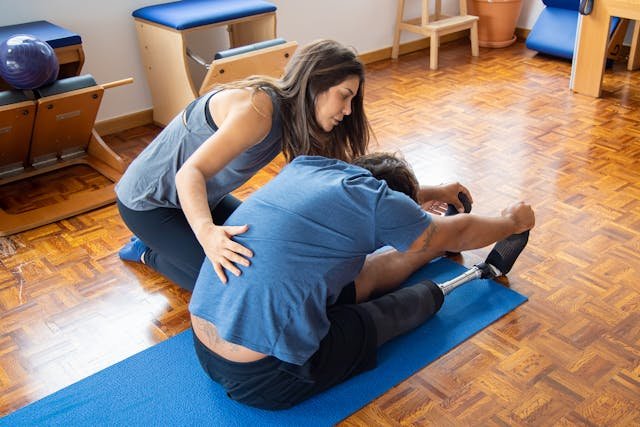
Friendships are a huge part of childhood, and children with prosthetics may worry about being accepted by their peers. Positive social interactions help them develop strong relationships and feel included.
Handling Questions and Curiosity from Peers
Children are naturally curious, and when they see a prosthetic, they often ask questions. Some children may not know how to respond, which can make them feel awkward or different.
Parents can practice simple, confident responses with their child, such as:
💬 “This is my prosthetic leg! It helps me run and play just like you.”
💬 “I was born this way, and my arm helps me do everything I love!”
By teaching their child how to explain their prosthetic in a friendly, upbeat way, parents help them navigate conversations with confidence.
Finding Supportive Friendships
Not all children will immediately understand limb differences, but true friends see beyond a prosthetic. Parents can encourage their child to form friendships with supportive and accepting peers—those who include them in games, treat them normally, and focus on who they are as a person.
If a child faces teasing or exclusion, parents should offer emotional support and remind them that their value isn’t defined by how others see them. Encouraging participation in adaptive sports, peer groups, or inclusive activities can help them find a strong sense of belonging.
Creating an Inclusive Environment
Schools and communities play a role in helping children with prosthetics feel accepted and included. Teachers, coaches, and caregivers should be educated on how to support and include children with prosthetics in all activities.
Parents can also advocate for their child’s needs, ensuring they have access to adaptive learning tools, accessible play areas, and inclusive sports opportunities.
4. The Emotional Strength and Resilience of Children with Prosthetics
While children with prosthetics face challenges, they also develop remarkable emotional strength and resilience.
Developing Problem-Solving Skills
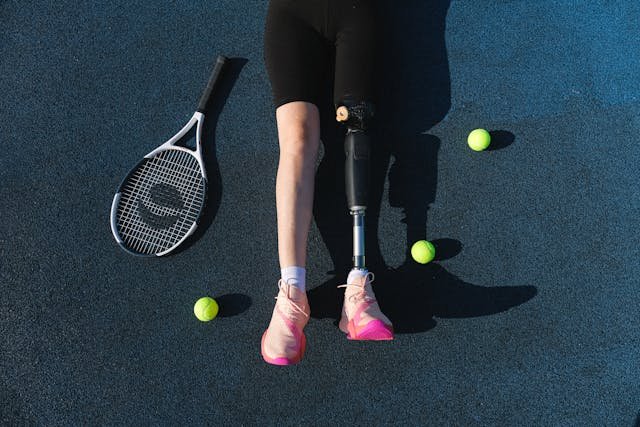
Children with prosthetics often become creative problem-solvers, finding new ways to perform daily tasks. Whether it’s tying a shoelace with one hand or adjusting their balance while playing, they develop a strong ability to adapt and overcome obstacles.
This skill not only helps them navigate life with a prosthetic, but also builds confidence in their ability to handle challenges in all areas of life.
Embracing a Growth Mindset
Children who use prosthetics learn that progress takes time. They celebrate small victories and understand that persistence leads to success. This growth mindset teaches them to approach difficulties with determination rather than frustration.
Parents can support this mindset by acknowledging their child’s efforts and celebrating even the smallest achievements.
Becoming Role Models for Others
Many children with prosthetics go on to inspire others. They show their peers that differences don’t define a person and that strength comes in many forms.
Encouraging children to share their experiences, mentor younger kids with prosthetics, or engage in advocacy efforts can help them see their own journey as an opportunity to inspire others.
5. How Parents Can Support Their Child’s Emotional Well-Being
A child’s experience with a prosthetic is deeply influenced by how their parents approach it. When parents normalize the prosthetic, encourage independence, and provide emotional support, children are more likely to feel confident and capable.
Creating a Positive Narrative Around the Prosthetic
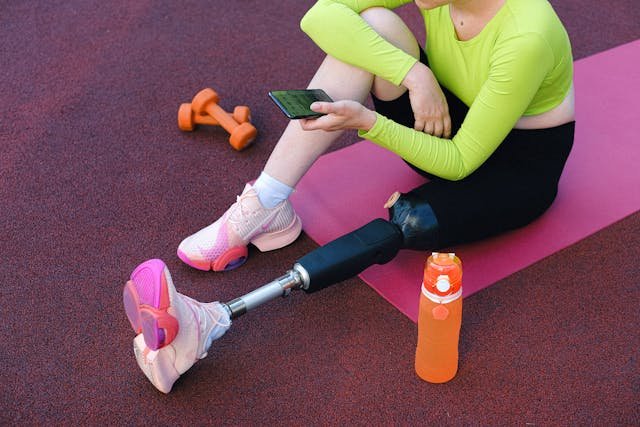
Children pick up on the emotions of their parents. If a parent is overly protective, hesitant, or anxious about their child’s prosthetic, the child may also view it as a problem. Instead, treating the prosthetic as a natural and empowering part of life helps children develop a healthy self-image.
Parents can encourage positive conversations, such as:
💬 “Your prosthetic helps you do so many amazing things!”
💬 “You’re strong and capable, and this is just one of the things that makes you special.”
💬 “Your prosthetic is like a superhero gadget—it makes you unstoppable!”
Framing the prosthetic in a positive and exciting way helps children view it as a strength, not a limitation.
Encouraging Independence and Self-Reliance
While it’s natural for parents to want to help their child, allowing too much assistance can make the child feel dependent or incapable. Encouraging children to put on their prosthetic, take care of it, and use it in daily activities fosters independence and confidence.
For example, if a child with a prosthetic arm is learning to button their shirt, parents can offer encouragement rather than stepping in too quickly. Small wins, like tying shoelaces or cutting food independently, help children realize their own capabilities.
At Robobionics, we design prosthetics that are easy for children to manage on their own, promoting a sense of independence and self-sufficiency.
Providing a Safe Space for Emotional Conversations
Children may have complex feelings about their prosthetic, ranging from excitement to frustration or sadness. Creating a safe and open space for these conversations allows children to express their emotions without fear of judgment.
Parents can ask:
💬 “How are you feeling about using your prosthetic?”
💬 “What’s been the best part of having it? What’s been the hardest?”
💬 “Is there anything I can do to make things easier for you?”
Listening, validating their feelings, and offering emotional support help children process their experiences in a healthy way.
6. How Schools Can Help Children with Prosthetics Feel Included
For many children, school is where they form friendships, build social skills, and gain confidence. A positive school experience greatly impacts a child’s emotional well-being.
Educating Teachers and Classmates About Prosthetics
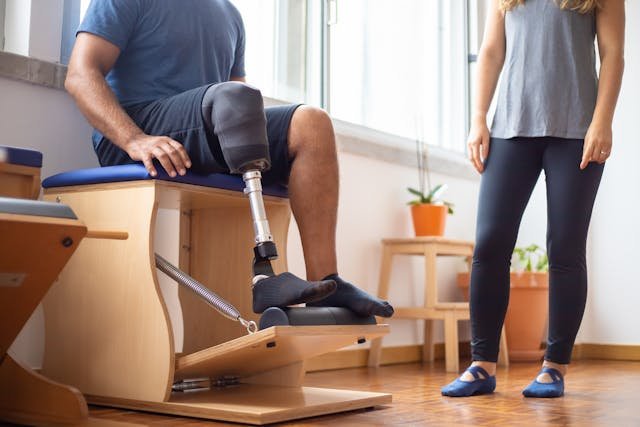
Many children with prosthetics feel uncomfortable at school because their peers don’t understand limb differences. Educating classmates about prosthetics helps create a supportive and inclusive environment.
Teachers can introduce the prosthetic in a way that normalizes it, such as:
💬 “This is [Child’s Name], and they have a cool prosthetic limb that helps them do everything they love!”
Encouraging curiosity in a respectful way helps classmates become more accepting and supportive. Schools can also include disability awareness programs to help students understand that differences are normal and should be embraced.
Encouraging Full Participation in School Activities
Children with prosthetics should be encouraged to participate in all school activities, from sports and art to science experiments and group projects. If a child struggles with a task due to their prosthetic, teachers can help them find an adaptive way to participate rather than excluding them.
For example, if a child with a prosthetic arm finds it hard to hold a paintbrush, a modified grip or adaptive tools can help them fully engage in the activity.
At Robobionics, we create prosthetics that are functional for school activities, ensuring that children can engage in learning and play without limitations.
Creating an Anti-Bullying and Supportive Environment
Children with prosthetics may sometimes face teasing or bullying. Schools should actively promote kindness, inclusivity, and respect by addressing bullying immediately and encouraging peer support.
Teachers can assign buddies to help children with prosthetics feel included, or create disability awareness programs that teach students the importance of accepting differences.
7. Finding Strength in Community and Role Models
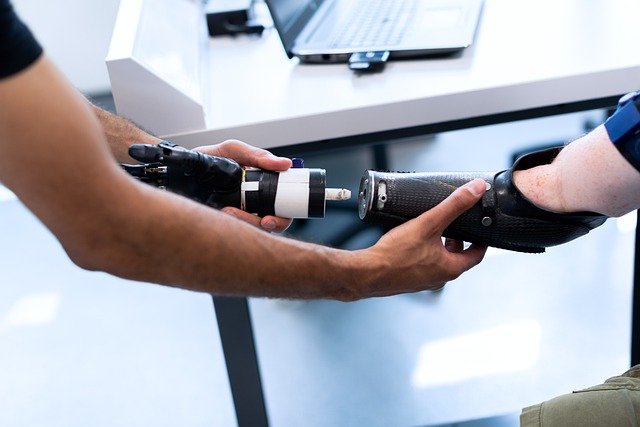
Children with prosthetics often gain confidence when they see others thriving with similar experiences. Connecting with support groups, role models, and adaptive sports teams helps them feel understood and empowered.
Connecting with Other Children with Prosthetics
Being the only child in a school or community with a prosthetic can feel isolating. Attending support groups, summer camps, or online communities where children can meet others with prosthetics helps them feel less alone.
Sharing experiences with peers who understand their journey boosts confidence and self-acceptance. Parents can look for local or online communities that provide social interaction and mentorship.
Finding Role Models Who Inspire Confidence
Seeing athletes, musicians, artists, and professionals with prosthetics can motivate children to dream big. Role models show children that a prosthetic does not define their potential.
Parents can introduce their child to stories of inspiring individuals who have achieved greatness with prosthetic limbs. These stories reinforce a positive self-image and inspire children to pursue their own passions.
Exploring Adaptive Sports and Hobbies
Adaptive sports and activities allow children to push their limits and build confidence. Whether it’s swimming, running, climbing, or playing an instrument, finding a passion helps children see their prosthetic as a strength, not a limitation.
At Robobionics, we design prosthetics for sports, arts, and everyday activities, helping children explore their full potential.
Final Thoughts: Helping Your Child Thrive Emotionally with a Prosthetic
The psychological impact of wearing a prosthetic as a child is shaped by self-perception, social experiences, and emotional support. While challenges exist, children who receive encouragement, acceptance, and opportunities to express themselves grow into confident, strong, and independent individuals.
At Robobionics, we are committed to helping children not just walk, run, or grasp objects—but live fully, fearlessly, and with pride.
🚀 Looking for a customized, child-friendly prosthetic? Book a free consultation with our experts today!
💡 Have questions? Contact us now to explore the best prosthetic solutions for your child’s needs!



